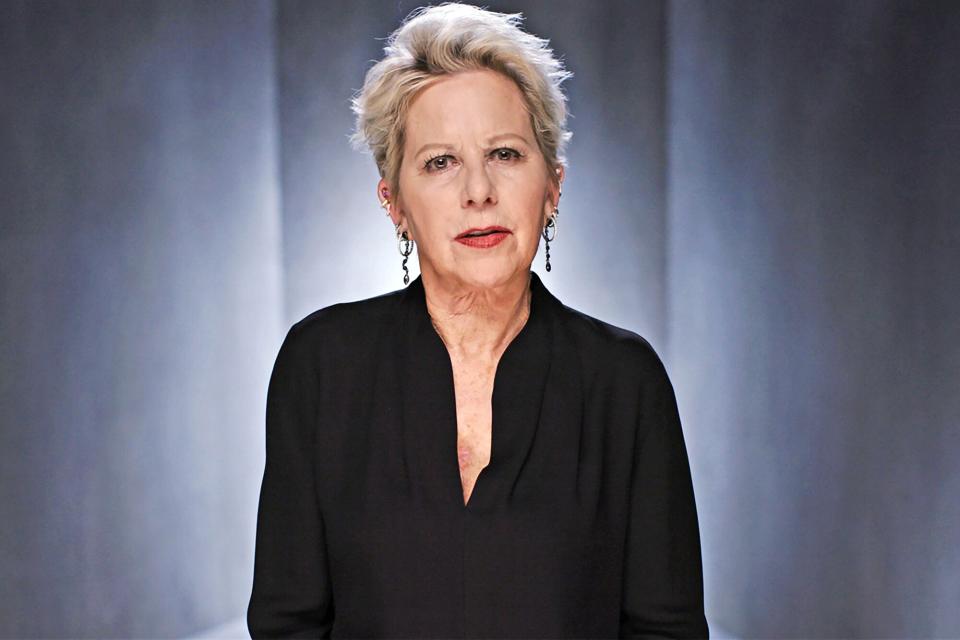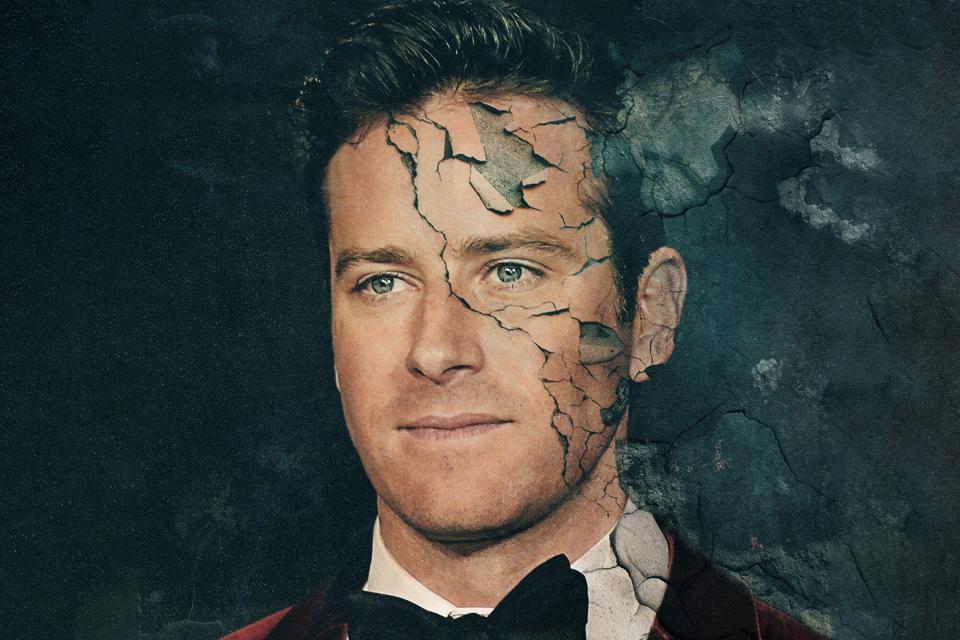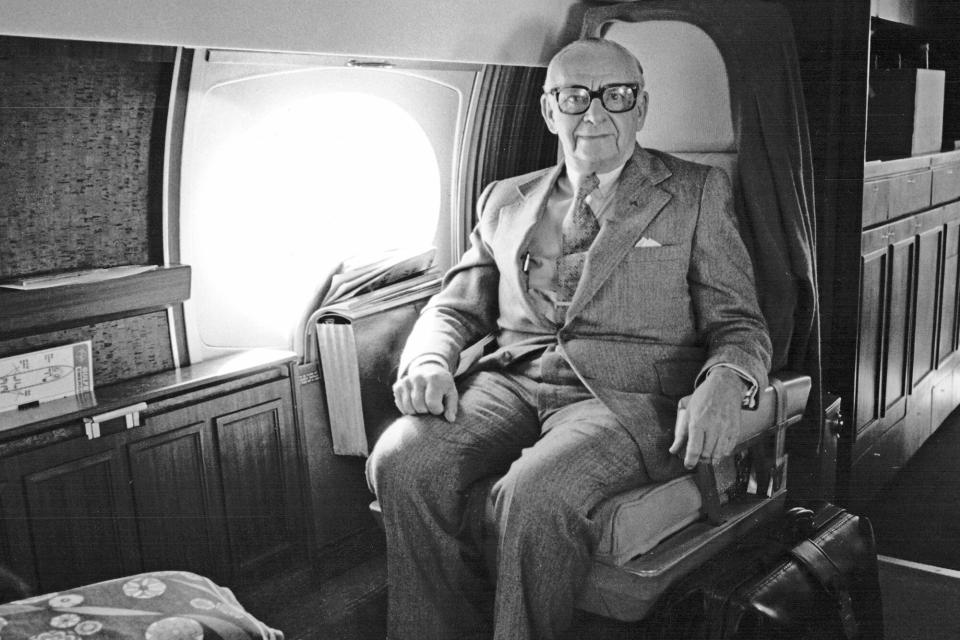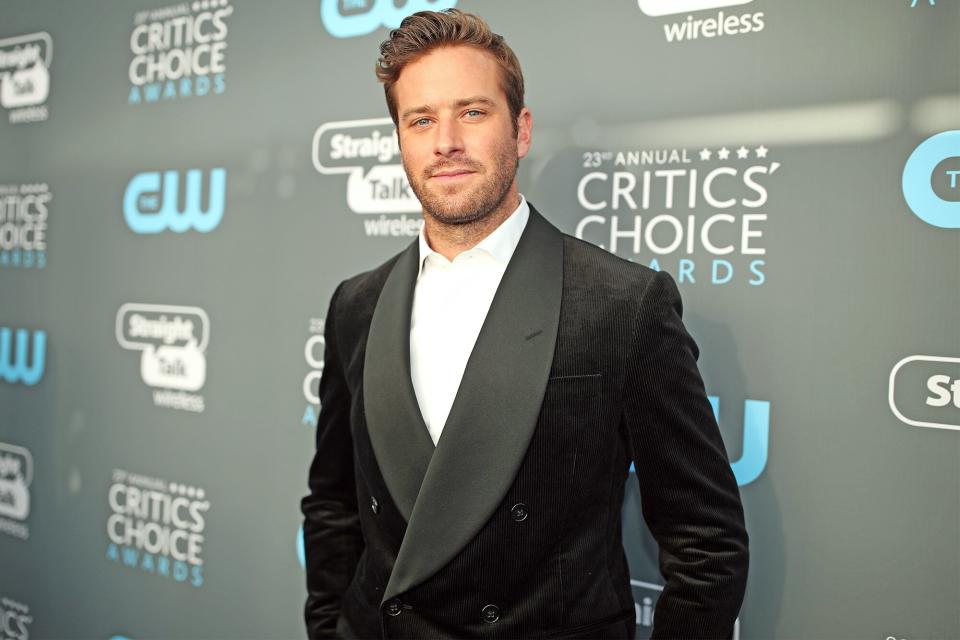Armie Hammer's aunt describes pattern of bad behavior: 'He was the next in line for the throne'

- Oops!Something went wrong.Please try again later.
Kendall Roy has got nothing on Casey Hammer.
The estranged aunt of embattled actor Armie Hammer reveals dark family secrets in House of Hammer, Discovery+'s three-part docuseries that explores the lineage of abusive and violent men in the Hammer family. Director Elli Hakami and Julian P. Hobbs' series begins with the sexual assault and cannibalism allegations against her nephew, but evolves into a tale of privilege, wealth, and violence that traces back to Armand Hammer, Armie's late great grandfather and billionaire oil tycoon with deep pockets but deeper ties to powerful people and places, including the White House and Buckingham Palace.
"It exposes not only Armie, but it exposes my family and what I've been saying for the last 61 years about the multi-generational abuse by the men," Casey, who remains estranged from her surviving family members, tells EW. (The actor has denied all of the allegations against him.)
In 2015, Casey published a memoir, Surviving My Birthright, that details much of the stories featured in House of Hammer. She once witnessed her father, the late, volatile Julian Hammer, beat her mother, resulting in blood stains on her clothes. She was also sexually abused by her father, who had drug-fueled parties and, once, while under the influence, put a gun to her head. When producers approached her to participate in the series after reading her memoir, Casey knew she wanted to help spotlight the voices of the women who have accused her nephew of the violence she says she knew all too well.

Discovery+ Casey Hammer in 'House of Hammer'
Below, Casey speaks to EW about the series and her family's dark legacy — one that makes the plot of Succession look like Full House.
ENTERTAINMENT WEEKLY: How did your involvement in the series come to be?
CASEY HAMMER: When I wrote Surviving My Birthright, it was more of a healing. It was more of a way for me to come to grips with what I was feeling [and] trying to make sense of my life. When I finished and self-published it, I remember getting the first copy. It was like, "Wow, I'm holding validation of my life." It was one of those moments where even if I'm the only one that reads it — I mean, a few of my friends, I forced it on them — it was so freeing. I controlled the narrative. Every now and then, one of my coworkers might find it, because it's not something I talked about necessarily, and they would say, "I read it. Oh my God. It helped me." And it would mean the world to me. I saw the power in it and was at peace with, "Wow, that was cool, that I helped somebody."
I was down in San Diego last year, seven years after I self-published, and working as a kitchen designer at Home Depot. One of my coworkers was like, "Casey, you need to get on TikTok. There's someone called @thezenblonde blowing you up." I'm tech challenged, so I don't do social media, really. I went from five followers to like 5,000 in a few hours because of @thezenblonde, who was live reading [my memoir]. I think it was at least 14 TikTok viral videos. I couldn't believe what was happening… all of a sudden, it's out there and I didn't have control… It's like being on a roller coaster and just taking the death drop. A few months later, because of @thezenblonde exposing my book, the producers came forward.
I had the media reaching out because of course they all wanted me to comment — once they found out that I was [Armie Hammer's] aunt — on his misdeeds and behavior. I didn't want to be a soundbite for his implosion. That's not what I wanted to speak to. I wanted to talk about the victims. That was the true spotlight of everything. I wanted to be an advocate for their healing. It's sad because you're isolated, you're blamed, you're shamed, you're all kinds of crazy things, especially when it's a powerful, famous, wealthy family. It's scary. When the producers reached out and said they read my book and wanted to tell the story this way, it was one of those moments where I knew they would do an amazing job.
It exposes not only Armie, but it exposes my family and what I've been saying for the last 61 years about the multi-generational abuse by the men. Because I was raised that way, I didn't know any better. We didn't have social media. It's not like I could check to see if there were other wealthy families that were this dysfunctional. Once you walked out the front door, you couldn't talk about anything. You had to be perfect. It was all about image and control. That's a long-winded answer of why I'm so passionate about it. I believe this is my purpose: to empower women and empower people to say, "No, I'm done."

Discovery+ Armie Hammer in the 'House of Hammer' poster
Were there any reservations to revisit the past after reexamining it in your memoir?
Absolutely. There always is. Even when I watch House of Hammer, I am retriggered. It's hard to watch. It's horrifying. People may tune in for a different reason, thinking it's entertainment, but once you get into it, it's unlike anything of what they're expecting. But again, that was my life. It's one thing to read about your life, but it's another thing to see it on the screen and having moments reenacted. It's hard to watch. I mean, of course I'm fearful. My family's always been very threatening. If you ever did anything wrong or said anything wrong, and when you have a lot of money and attorneys and power behind you.
In the docuseries, you see where my father got away with murder, literally, and my grandfather paid [for] that to go away. It's time for people with that kind of wealth and power and influence to be stopped because they really believe they're entitled. They have nobody policing them. They can get away with murder. . . House of Hammer really spotlights the victims — the brave women who are smart and intelligent, yet they got sucked into this vacuum of abuse and manipulation.
The docuseries talks about consent too, which is also a very important topic. A lot of times people don't necessarily understand, "Well you said you liked it, so…" If there comes a point where you're uncomfortable or you don't want to participate or do that anymore, they need to stop. And if they don't, that's criminal, and they need to be held accountable.
What were some of the ramifications, if any, of telling your story with your memoir?
When I first wrote the book, my mother was still alive, and she knew about it, and again, knew all that was happening. Didn't stop any of it. So that was a whole other issue to have to deal with. But it was important for me to put it in writing and to speak my truth, and maybe to give her an option to say, "I'm sorry. I love you. I'm sorry I wasn't there for you." It didn't happen. So it was more about my process and being okay with me. I used to always say, "Your family doesn't necessarily have to be your blood. It can be the people that you choose to surround yourself with." But a lot of times you put up with a lot of things because they're your family, they're your blood.
Most of my family passed away. It was a very small family. My father was an only child. I'm not in contact with any of [my surviving family]. When I saw House of Hammer, I was shocked. And it's my life. I have always feared for my life and the ramifications being raised in this family. I could choose to live in fear to this day, but then I'm giving my power away. So it's like, if it's my time, it's my time, but I can go out knowing that I made a difference and I helped one person. I'm going to live my true, authentic self in this moment and know that I can't change the past and I can't change the future. I can just affect the way I present myself and handle myself and show up for myself at this moment. That's where my head is these days.

BERTRAND LAFORET/Gamma-Rapho/Getty Armand Hammer in 1977
You serve as a consultant on the series. Did you learn any new or surprising information about your family while working on this? I ask because I went into this thinking, "I know what this will be about." Then I'm told, "Armand was a Soviet spy."
I knew some of the authors that have contributed and wrote books about my grandfather. And I knew the fake story that my grandfather told the public about his charmed life and a sense of his passion to get the Nobel Peace Prize, and why he deserved it. But then again, there were some things that came out that I was shocked about. That was one of the first things I said to the producers was, "Oh my gosh, I didn't realize that." I don't know if they just didn't tell me because they wanted it to be a surprise. But remember that we only had three [hours total in episodes]. I mean, there can be so much more that could be uncovered. It's just mind boggling. I believe people that watch it are going to be able to form their own opinions after they've seen all three hours. And I'm so glad that they're dropping it all at once, because this is totally a binge-worthy, better than Succession moment.
There's a moment of levity when you share an anecdote about a young Armie, who you call a brat, kicking you in the shins after your brother tells him to give you a hug. What was your relationship like with him when he was growing up?
He was adorable. He was a toe-head little boy that was gorgeous, but he was a brat. And God forbid you say anything or punish him or do anything… he was the heir apparent, he was the next in line for the throne. I mean, he was a male and he had the name, so you had to respect anything he did. But it's one of those things where [when] I was around him when he was little, [it] was [for] the fake family stuff out in the public where you would go to brunch at a country club or grandpa's house, and you would all pretend to get along and love each other. It was all for the cameras, and everywhere we went was photographed or videotaped. My grandfather had a production company that followed us around everywhere. And we were under surveillance whether we were with the family or not.
What has your relationship been like with him in the last couple of years?
I don't have one. Once my mom passed away, again, we all just went our separate ways, and it's better that way.

Christopher Polk/Getty Armie Hammer
Hollywood appears to be an idyllic place for men accused of terrible things. Do you think we'll be seeing an Armie Hammer redemptive arc in the future?
I just want people held accountable. It's almost like the lights [are] being turned up on men and their bad behavior, especially Hollywood power people. I've seen the power of social media, I've seen how @thezenblonde changed my life, I've seen how TikTokers jump on a cause. They're all about redemption and righting a wrong. I've seen that like a tidal wave. So I just see it as, "Let them decide on their own." For me, I believe in the justice system. So again, the thing about the docuseries is that it brings together facts and tells the story of how people need to be held accountable. I mean, how this kind of behavior is happening now. How shocked are you when you see that, that this is even happening now, that this is even a conversation? It's something that needs to stop. Victims need to come forward and not be afraid [and say] "That's not okay anymore." There are people that are going to help you. Now, shining a light on survivors and bad behavior and consent and all those aspects that are all beautifully woven into House of Hammer, it's really amazing. I'm just proud to be a part of it. I don't know what's going to happen next, but this, today, in this moment, it's pretty cool.
Speaking of Hollywood, and correct me if this is inaccurate, but IMDb says you starred in the 1992 film Leap of Faith, with Steve Martin and Liam Neeson.
[Laughs] So, funny story. I love you for that one. When my grandfather died, I could do anything I wanted, meaning I could choose any career path. I always wanted to be an actor. I gave up my retail career. I studied and I'm an overachiever so [I wanted to] be the best possible actor I could be. I was at Stella Adler [Studio of Acting], I was at Howard Fine [Acting Studio]. I was studying, studying, studying. Talk about nepotism and its hold, right? The executive producer and the writer who wrote Leap of Faith was like, "Well, Casey, we can give you a small part and you can get your SAG card." Because I couldn't get an agent.
The most exciting thing was, yes, I was in that movie with Steve Martin. Steve Martin used to come to the parties at my grandfather's, at the [Hammer Museum]. But it was funny because it's like, that was my high point. I had one line, and I made it, and I was even in the trailer. I still love to watch it just because it was pretty fun. But it was at that moment that I realized, "No, I don't want to be an actor anymore. I want to be a producer because they have more control." There you go. That's how I was raised. So that was my journey. But it was one of those moments where [I thought], "Oh my God, I don't have to be in retail. I could do whatever I want to do." It was very freeing for me.
Would you ever consider a return to Hollywood, whether in front of the camera or behind it?
No, I think my role — I mean, I would love to be able to continue this new path of mine by doing TED Talks and talking and telling my story and my truth and helping others. I think that's my journey now. I've learned, if nothing else, that Hollywood and all the money and having all the things doesn't necessarily buy you happiness. Your priorities change. In my 20s I might have had a completely different answer for you. But right now it's like, you know what? I just want to live my best life. I want to write my books. I want to speak and I just want to change lives. The old Casey, it would've had to have been a huge ginormous scale, based on my grandfather. But now, if I can just help a few people and make a difference… I mean, look at what the universe brought me: an amazing team that helped us make this amazing docuseries that's going to hopefully open a lot of people's eyes to great injustices that are being done and make a difference.
Your memoir, your entire life, really, is a story of hope and reclaiming one's self. What are some of the things that give you hope these days?
Well, I just finished writing a children's story. It's illustrated. I hope to get a publisher and turn it into a Disney or a Pixar animated film. It's about a little girl having the best childhood ever. So it's like, little Casey. Now, as an adult, when I go back to being triggered or the trauma, it's hard for me because I think of that little 12, 13-year-old that I couldn't save or keep safe or rescue back then. Now, as an adult Casey, I take her hand and I tell her I'm going to keep her safe and I'm going to look out for her. By writing this children's story and this whole series of books, it gives me hope and her hope, that I'm saving her and saving me in the same breath.
This interview has been edited and condensed for clarity. All three episodes of House of Hammer are available to stream now on Discovery+.
Sign up for Entertainment Weekly's free daily newsletter to get breaking TV news, exclusive first looks, recaps, reviews, interviews with your favorite stars, and more.
Related content:

